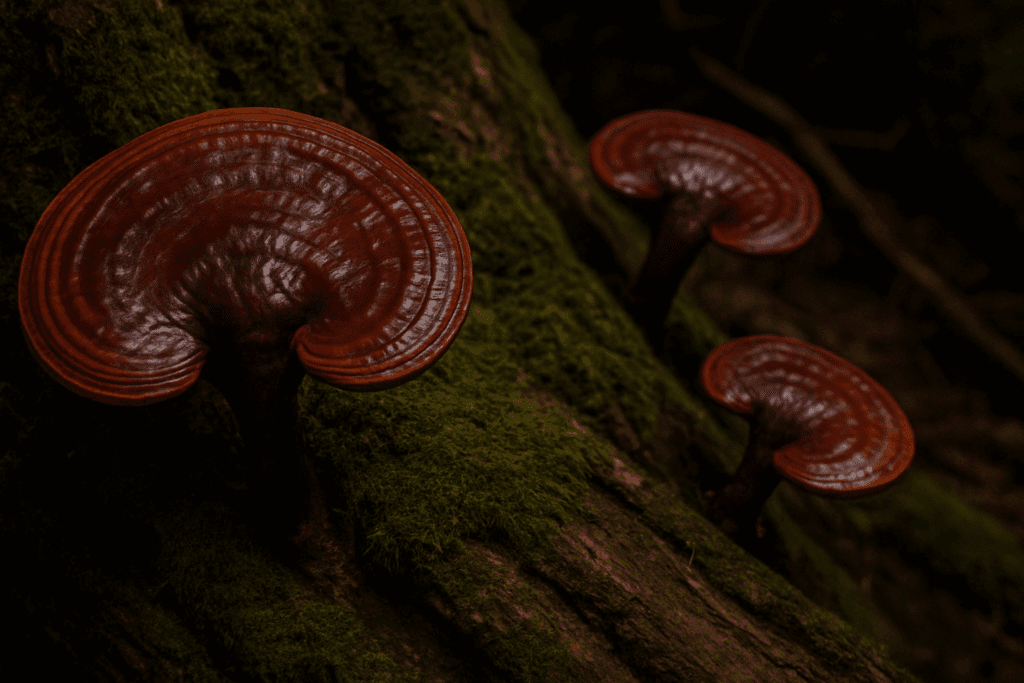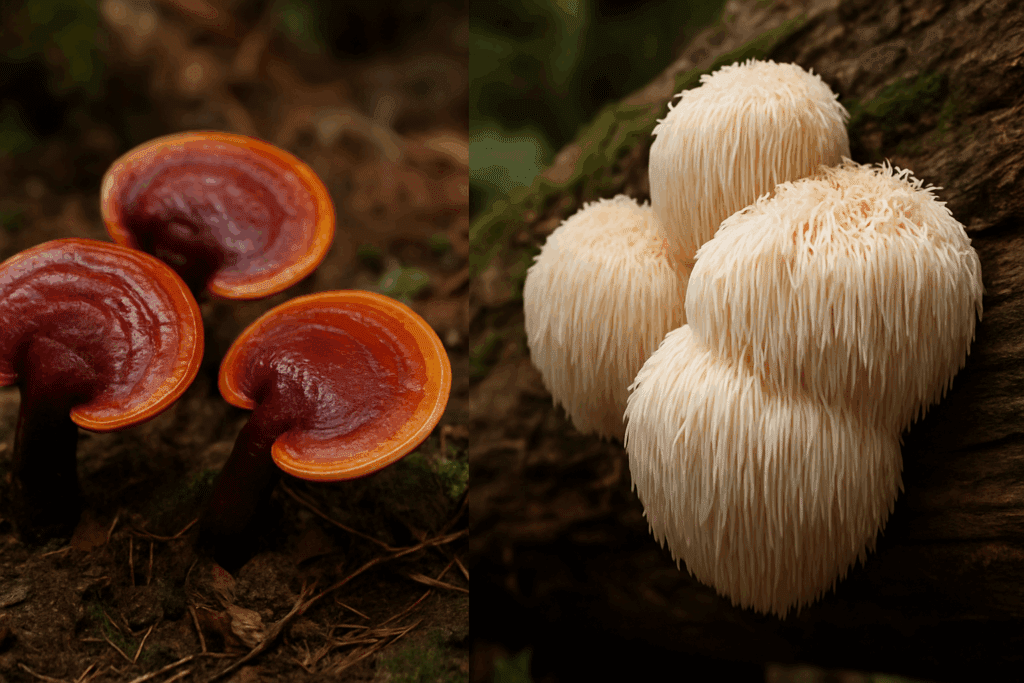In recent years, natural remedies have captured the attention of wellness seekers worldwide, especially when it comes to managing the physical and emotional complexities of pregnancy. Among these natural remedies, reishi mushroom stands out as a time-honored adaptogen that has been celebrated in traditional medicine for centuries. Today, expectant mothers are increasingly curious about the safety, benefits, and implications of using reishi mushroom during pregnancy, particularly in addressing stress and hormonal imbalances that are common throughout this transformative period. This article explores the essential insights surrounding this powerful medicinal mushroom, offering an evidence-based perspective on its use during pregnancy.
You may also like: The Essential Guide to Reishi Mushroom Benefits: How to Use Reishi Mushroom Powder for Stress Relief and Adaptogenic Support

Understanding Reishi Mushroom: Origins, Uses, and Adaptogenic Properties
Reishi mushroom, also known by its scientific name Ganoderma lucidum, has been widely recognized in Eastern medicine as the “mushroom of immortality.” Used for more than 2,000 years in China, Japan, and Korea, reishi is considered one of the most potent adaptogens—a class of herbs and fungi that help the body resist stressors and maintain balance. The mushroom’s unique composition includes triterpenoids, polysaccharides, and peptidoglycans, all of which contribute to its anti-inflammatory, immunomodulatory, and anti-fatigue effects. These properties have made reishi an attractive supplement for those looking to improve sleep, boost immune function, and regulate stress.
Modern research continues to validate many traditional claims about reishi. Studies show that it can modulate cortisol levels, reduce anxiety symptoms, and support overall endocrine function. These mechanisms align closely with the challenges many women face during pregnancy, including mood swings, hormonal fluctuations, and heightened stress responses. While reishi mushroom pregnancy concerns are valid and necessitate careful scrutiny, understanding its foundational properties helps us approach the topic with scientific clarity and respect for individual health variations.
Is Reishi Safe During Pregnancy? Assessing the Evidence
One of the most pressing questions among expectant mothers and healthcare providers alike is this: is reishi safe during pregnancy? Unfortunately, the answer isn’t universally straightforward. While reishi has been extensively studied for its therapeutic benefits, specific clinical research on its effects during pregnancy is relatively sparse. This lack of targeted studies means that safety assessments must often rely on broader evaluations of reishi’s pharmacological profile and traditional usage patterns.
That said, existing evidence does not suggest that reishi is overtly harmful when used in moderate amounts. Animal studies have demonstrated its safety in various biological systems, though caution is advised due to the absence of longitudinal human trials specifically focused on pregnant populations. Furthermore, reishi’s immunomodulatory properties may impact pregnancy-related immune adaptations, a phenomenon that could pose both potential benefits and risks depending on individual physiology.
Healthcare professionals often recommend a conservative approach: avoid introducing new supplements during pregnancy without direct supervision from a qualified practitioner. Nevertheless, many integrative practitioners recognize reishi as a potentially supportive adjunct when used in appropriate doses, particularly for managing anxiety and sleep disturbances. If you are considering reishi during pregnancy, it is essential to consult with an experienced healthcare provider who understands both conventional obstetrics and botanical medicine.

Reishi Mushroom During Pregnancy: A Natural Ally for Stress and Anxiety
Pregnancy is often described as a joyous journey, but it can also be marked by intense emotional shifts, stress, and anxiety. These emotional states, if left unaddressed, can have downstream effects on both maternal and fetal health, including increased cortisol levels, disrupted sleep, and heightened blood pressure. For many women seeking a natural, gentle way to manage these stressors, reishi mushroom during pregnancy may offer a promising solution.
Reishi’s adaptogenic capabilities lie in its ability to regulate the hypothalamic-pituitary-adrenal (HPA) axis, the central system responsible for stress response. By helping to stabilize cortisol secretion and enhance parasympathetic nervous system activity, reishi may promote a greater sense of calm and emotional equilibrium. This is particularly valuable during pregnancy, when hormonal fluxes often exacerbate emotional sensitivity.
Emerging research supports the use of reishi for mood stabilization. In one study, participants who consumed reishi extract reported lower levels of anxiety, improved concentration, and better sleep quality within four weeks. Although not exclusive to pregnant women, these findings are relevant when considering non-pharmacological interventions for prenatal stress. While further research is warranted, the current body of evidence suggests that reishi may act as a gentle, effective ally for emotional support when used responsibly during pregnancy.

Navigating Hormonal Balance with Reishi Mushroom Pregnancy Support
The endocrine system undergoes profound changes during pregnancy, with fluctuating levels of estrogen, progesterone, and other hormones essential for fetal development and maternal well-being. Maintaining hormonal balance is critical, not only for physical health but also for emotional and cognitive stability. Reishi mushroom pregnancy support offers a unique perspective on harmonizing these complex physiological processes.
Reishi is believed to influence the endocrine system by modulating hormone production and receptor sensitivity. For example, it has been shown to support adrenal function, which is intimately linked to progesterone synthesis—a hormone vital for maintaining pregnancy. Additionally, its antioxidant properties may help protect endocrine tissues from oxidative stress, a factor known to disrupt hormonal harmony.
Some integrative health practitioners suggest that reishi’s polysaccharides may also support the thyroid gland, which plays a pivotal role in regulating metabolism during pregnancy. Thyroid imbalances are common among expectant mothers and can lead to complications if unaddressed. While reishi is not a substitute for medical treatment, its supportive effects on glandular health could make it a valuable part of a broader prenatal wellness plan.
Expert Perspectives: Is Reishi Safe During Pregnancy When Supervised?
To gain a deeper understanding of reishi’s safety profile during pregnancy, it’s helpful to consult expert opinions from various fields, including naturopathic medicine, obstetrics, and pharmacognosy. While conventional medical professionals often advise against the use of any untested supplements during pregnancy, many functional and integrative practitioners adopt a more nuanced approach.
Dr. Tieraona Low Dog, a renowned expert in integrative women’s health, has noted that certain adaptogens, including reishi, may be cautiously used during pregnancy under clinical supervision. She emphasizes the importance of individualized care, suggesting that reishi could be suitable for women with high stress levels or immune vulnerability when used in therapeutic, non-excessive doses.
Pharmacologists caution that reishi’s anticoagulant properties could pose risks for individuals prone to bleeding or those taking blood-thinning medications. This makes it essential to assess personal health history before incorporating reishi. Still, in the absence of contraindications, many experts agree that the mushroom’s gentle nature and long history of traditional use position it as a candidate worth exploring under medical guidance.

Comparing Reishi and Other Adaptogens Like Lion’s Mane in Pregnancy
While reishi garners attention for its stress-reducing and immune-boosting properties, other adaptogenic mushrooms such as lion’s mane also warrant discussion. Known for its neuroregenerative potential, lion’s mane pregnancy inquiries have increased, especially among women concerned with cognitive function and mental clarity during gestation.
Lion’s mane, or Hericium erinaceus, has been shown to stimulate the production of nerve growth factor (NGF), a protein essential for neuronal health. This property makes it particularly appealing for managing brain fog and mild cognitive impairment, common concerns during pregnancy. However, like reishi, lion’s mane lacks robust clinical trials focusing exclusively on pregnant populations.
The key distinction lies in their primary effects: while lion’s mane pregnancy use is often geared toward cognitive support, reishi mushroom during pregnancy focuses more on emotional equilibrium, immune resilience, and hormonal modulation. For women navigating multiple symptoms, some practitioners may recommend a synergistic blend of both mushrooms, provided there are no individual contraindications. As always, such a decision should be made in collaboration with a qualified healthcare provider.
The Historical Use of Reishi During Pregnancy in Traditional Medicine
Exploring the historical context of reishi during pregnancy sheds light on its longstanding use and cultural significance. In Traditional Chinese Medicine (TCM), reishi has been valued for its ability to replenish qi (vital energy), calm the shen (spirit), and nourish the blood. These attributes are particularly revered during pregnancy, a time when preserving maternal vitality and emotional tranquility is paramount.
Classical texts often prescribed reishi in low doses for pregnant women experiencing palpitations, insomnia, or excessive worry. Its use was not indiscriminate but rather tailored to the individual’s constitution and specific imbalances. Herbal formulas containing reishi were commonly used to strengthen the heart and calm the nervous system, particularly in the later stages of pregnancy when physical and emotional fatigue peaks.
These traditional practices provide a compelling, albeit anecdotal, foundation for modern applications. While modern clinical trials are needed to corroborate ancient wisdom, the alignment between traditional uses and current anecdotal reports suggests that reishi’s gentle properties have been respected across generations.

Understanding Potential Risks of Reishi Pregnancy Supplementation
Despite its therapeutic promise, it’s important to acknowledge the potential risks associated with reishi pregnancy supplementation. As noted, one area of concern involves its blood-thinning effects, which could complicate pregnancies involving bleeding disorders, clotting issues, or planned surgical interventions such as cesarean sections. Women with a history of miscarriage or placental issues should exercise particular caution.
Another consideration involves dosage and formulation. Reishi is available in multiple forms, including capsules, tinctures, powders, and teas, each with varying concentrations of active compounds. High-potency extracts may carry a higher risk of side effects, including gastrointestinal discomfort, dry mouth, or dizziness. For pregnant individuals, starting with a low dose and gradually adjusting based on tolerance may be the safest approach—but only under supervision.
Moreover, product quality plays a crucial role in safety. Not all supplements are created equal, and reishi products can vary widely in purity, potency, and contamination levels. It is essential to choose products that are third-party tested, certified organic, and free from fillers, heavy metals, or adulterants. Reputable brands should provide transparent sourcing information and quality assurance protocols.
How to Use Reishi Mushroom Safely During Pregnancy
For those who decide to incorporate reishi mushroom during pregnancy under professional guidance, a few best practices can help ensure safety and effectiveness. First, timing is important. Some practitioners suggest avoiding reishi during the first trimester when the fetus is most vulnerable to external influences, and instead introducing it during the second or third trimester if needed for emotional or immune support.
Dosage should always be personalized. While general adult recommendations range from 1 to 3 grams of dried extract per day, pregnant women may benefit from lower doses, especially when used consistently over time. Water-extracted products are often preferred due to their gentler nature and focus on polysaccharides rather than triterpenes, which may be more stimulating.
Pairing reishi with a nutrient-dense diet and other calming practices such as prenatal yoga, meditation, and breathing exercises can enhance its benefits. As with any wellness strategy, the goal should be integration, not substitution. Reishi is not a panacea, but it can be a valuable tool in the larger mosaic of prenatal health support.
Emerging Research on Reishi Pregnancy Applications
Though limited, emerging research is beginning to explore the potential of reishi mushroom pregnancy applications beyond anecdotal accounts. Preclinical studies have examined its role in immune modulation during gestation, particularly in mitigating inflammation-related complications. Other research is investigating reishi’s influence on placental health and fetal development, though findings remain in the early stages.
One study published in the journal Phytotherapy Research highlighted reishi’s potential to reduce oxidative stress in reproductive tissues, a promising avenue for conditions like gestational hypertension or preeclampsia. Although these studies are not yet definitive, they signal a growing scientific interest in reishi’s therapeutic scope during pregnancy.
Researchers are also exploring reishi’s synergy with other adaptogens and nutrients. For example, its combination with B-complex vitamins, omega-3 fatty acids, and magnesium has shown preliminary promise in enhancing mood and stress resilience during pregnancy. Future clinical trials will be essential in confirming these synergistic effects and establishing standardized dosing protocols.
The Broader Implications of Reishi for Maternal Mental Health
Beyond its biochemical and physiological effects, reishi holds broader implications for maternal mental health. The perinatal period is increasingly recognized as a vulnerable window for the onset of mood disorders, including prenatal depression and anxiety. While pharmaceutical treatments are often effective, many women seek alternative approaches due to concerns about fetal exposure.
Reishi offers a plant-based, holistic alternative that supports both body and mind. By fostering a sense of groundedness, improving sleep quality, and enhancing emotional resilience, it can empower pregnant women to navigate the psychological complexities of this life stage with greater ease. Its gentle nature makes it especially appealing to those looking for non-invasive, sustainable solutions.
Moreover, incorporating reishi into a daily wellness routine can encourage mindfulness and intentionality. Preparing a warm reishi tea or engaging in a reflective practice while consuming the supplement can serve as a ritual that reinforces emotional self-care—a practice often neglected during the demands of pregnancy.
Frequently Asked Questions: Reishi Mushroom During Pregnancy
Can reishi mushroom during pregnancy support emotional resilience in the postpartum period?
While much of the attention is focused on reishi’s role during pregnancy itself, emerging holistic protocols also consider its potential to aid emotional resilience after childbirth. The postpartum period can bring intense hormonal shifts and psychological stress, sometimes contributing to postpartum depression or anxiety. Reishi’s adaptogenic nature could support the recalibration of the hypothalamic-pituitary-adrenal axis as it readjusts following birth. In particular, its calming influence on the nervous system might help new mothers manage disrupted sleep patterns, emotional exhaustion, and overwhelm. However, any postpartum use of reishi should be discussed with a practitioner, especially for breastfeeding mothers, as the interaction between reishi compounds and lactation hormones remains under-researched.
Is reishi safe during pregnancy for individuals with autoimmune conditions?
The question of whether reishi is safe during pregnancy becomes more nuanced when considering those with autoimmune conditions such as lupus, Hashimoto’s thyroiditis, or rheumatoid arthritis. Reishi is known for its immunomodulatory effects—it can both stimulate and suppress immune function depending on the body’s needs. This dual action, while beneficial in general immune support, introduces complexity during pregnancy, especially in autoimmune contexts where immune tolerance is already delicately balanced to protect the fetus. Women with autoimmune disorders should approach reishi pregnancy use with great caution and under the close supervision of a healthcare team familiar with both immunology and obstetric care. Tailored dosing strategies and consistent monitoring may be necessary to avoid immune overstimulation or suppression.
How does reishi mushroom pregnancy use intersect with traditional midwifery practices?
Many midwives, particularly those practicing within integrative or traditional frameworks, have long incorporated mushrooms and herbal allies into pregnancy wellness routines. Reishi mushroom pregnancy applications in such settings are often framed around nourishing the spirit, calming restlessness, and restoring energy—concepts deeply rooted in traditional systems like Ayurveda and Traditional Chinese Medicine. Some midwives may prepare gentle reishi teas during late pregnancy to help calm the nerves or support nighttime rest, often paired with grounding practices like acupressure or guided meditation. While these practices are anecdotal and not yet validated through clinical research, they demonstrate a longstanding belief in reishi’s gentle touch when used with discernment and cultural knowledge.
Can reishi during pregnancy influence labor outcomes or delivery experiences?
Although scientific data is limited, some practitioners speculate that the calming effects of reishi during pregnancy may translate into more relaxed labor experiences. By supporting emotional composure and potentially enhancing parasympathetic nervous system dominance, reishi might encourage smoother uterine contractions and help manage pain perception during childbirth. Additionally, if used in the weeks leading up to delivery, it may indirectly support stamina and immune readiness, both of which are vital for labor recovery. Still, more research is needed before drawing definitive conclusions, and any use of reishi in the final stages of pregnancy should be coordinated with an experienced birth professional who understands both the benefits and the boundaries of herbal interventions.
What role might reishi mushroom play in prenatal epigenetic health?
Epigenetics refers to the way environmental factors influence gene expression without altering DNA sequences. There’s growing interest in how natural compounds like reishi may affect prenatal epigenetic markers related to inflammation, stress response, and cellular longevity. The antioxidant and anti-inflammatory properties of reishi could, in theory, create a biochemical environment that supports healthy gene expression in both mother and fetus. This doesn’t mean reishi can directly alter genes, but rather that it might contribute to the cellular conditions that influence gene regulation. While such hypotheses are still under investigation, they reflect a new frontier in prenatal wellness where reishi mushroom pregnancy use may one day be seen as part of a broader epigenetic support strategy.
How does reishi mushroom compare with lion’s mane pregnancy support for cognitive changes?
Cognitive changes such as forgetfulness, difficulty concentrating, and “pregnancy brain” are common complaints. While reishi primarily supports emotional and immune health, lion’s mane pregnancy discussions often center on mental clarity and neurological function. Lion’s mane is known to encourage the production of nerve growth factor (NGF), which supports brain plasticity and memory. Reishi, on the other hand, works more through relaxation and neuroendocrine regulation, potentially reducing anxiety-related cognitive fog. A thoughtful approach might involve combining both, with lion’s mane offering cognitive sharpening and reishi providing emotional grounding—though such combinations should always be vetted by a knowledgeable provider to ensure safety and balance in the maternal system.
What are the potential long-term effects of reishi pregnancy use on fetal development?
The long-term effects of reishi mushroom during pregnancy on fetal development remain largely speculative due to the absence of longitudinal human studies. However, some animal research hints at protective benefits for neural and immune development, owing to reishi’s antioxidant profile and adaptogenic compounds. These effects may translate into enhanced resilience to environmental stressors postnatally, though this has yet to be proven in clinical settings. Some practitioners believe that using reishi to maintain maternal physiological balance could indirectly support fetal homeostasis, particularly in the areas of neurological maturation and immune programming. Until more data emerges, the long-term impact should be viewed with both optimism and caution, prioritizing well-informed and personalized care plans.
Could reishi pregnancy use affect nutrient absorption or interact with prenatal vitamins?
Reishi’s complex biochemical profile has the potential to interact with other nutrients and supplements, including those found in prenatal vitamins. Certain compounds in reishi, such as beta-glucans and triterpenes, may influence gut microbiota and enzyme activity, potentially altering how nutrients like iron, calcium, or folate are absorbed. Although this interaction is subtle and likely varies based on individual metabolism, it underscores the importance of mindful supplement stacking. For example, spacing out reishi and prenatal vitamin intake by several hours may minimize interference and optimize nutrient uptake. It’s also wise to monitor iron levels and energy patterns when using reishi, particularly in women who are borderline anemic or prone to fatigue.
Does cultural heritage influence perceptions of reishi mushroom pregnancy use?
Cultural background plays a significant role in shaping beliefs and practices around pregnancy wellness, including the use of mushrooms like reishi. In East Asian cultures, reishi has historically been considered a revered tonic for nurturing life force and promoting spiritual harmony, making its use during pregnancy more normalized and even celebrated. Conversely, in Western contexts, where pharmaceuticals dominate prenatal care, reishi pregnancy use is often met with skepticism due to the lack of FDA oversight and clinical trial data. These cultural contrasts highlight the importance of understanding context and honoring individual beliefs when discussing reishi with patients or clients. Respectful communication about reishi’s traditional significance can help bridge gaps in understanding and foster shared decision-making.
What future research directions are promising for reishi mushroom during pregnancy?
The future of research into reishi mushroom during pregnancy is likely to evolve in several exciting directions. First, clinical trials assessing its safety profile in pregnant populations are urgently needed, particularly randomized controlled studies that examine dosage, timing, and outcomes. Second, studies on reishi’s impact on perinatal mental health, including postpartum depression and anxiety, could offer valuable insights into alternative therapeutic pathways. Third, there’s potential to investigate how reishi might modulate pregnancy-related inflammatory markers or oxidative stress levels, which are relevant in conditions like preeclampsia or gestational diabetes. Finally, interdisciplinary collaborations between herbalists, obstetricians, and neuroscientists could yield more nuanced guidelines for using reishi and other adaptogens like lion’s mane during pregnancy. Such advancements would help clarify whether reishi during pregnancy belongs not just in traditional medicine, but in the future of integrative maternal healthcare.
Final Thoughts: Integrating Reishi Mushroom into a Balanced Prenatal Wellness Plan
As interest in integrative and holistic health continues to grow, reishi mushroom during pregnancy emerges as a compelling option for those seeking natural support for stress and hormonal balance. While questions about safety, efficacy, and appropriate use remain, the cumulative wisdom of traditional medicine, emerging scientific evidence, and expert clinical perspectives offer a well-rounded foundation for informed decision-making.
When used responsibly, reishi may provide a gentle, effective means of enhancing maternal well-being during one of life’s most delicate and transformative journeys. Still, it is crucial to approach its use with discernment, professionalism, and personalized guidance. No single supplement can replace the importance of prenatal medical care, but reishi, when integrated thoughtfully, can enrich a broader prenatal wellness strategy that honors both scientific rigor and holistic tradition.
Further Reading:
Mushrooms – A Pregnancy Superfood
Reishi Mushrooms During Pregnancy: Are They Safe? (Risks, Tips, & More)
